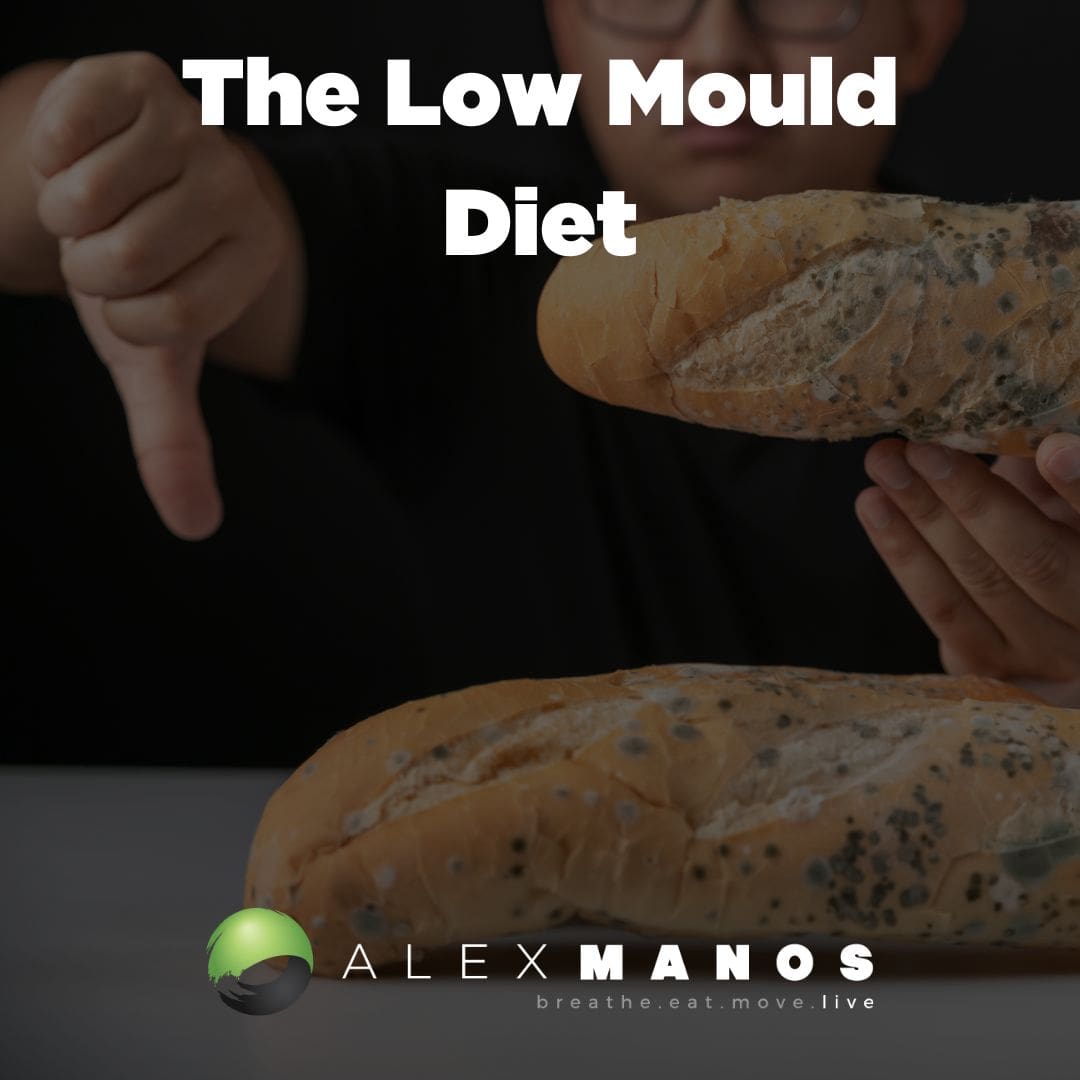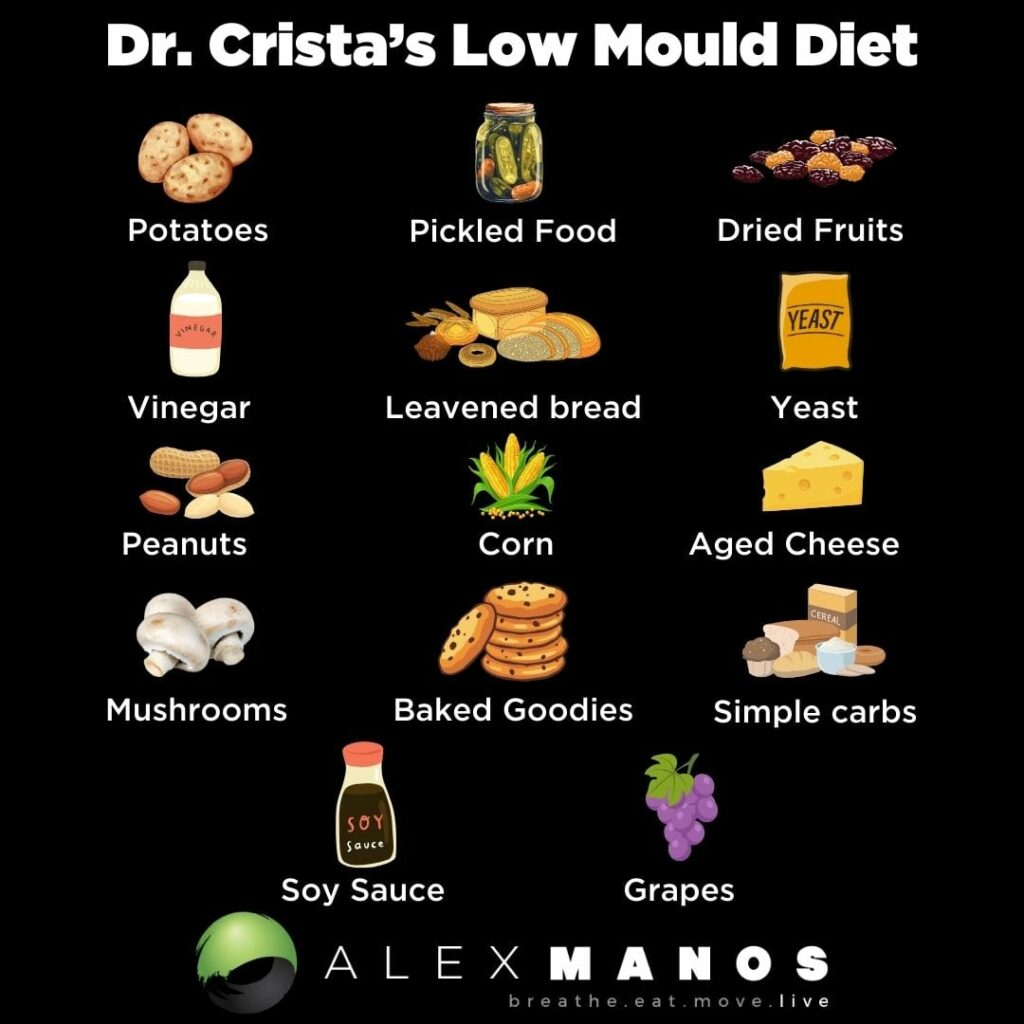Welcome to my blog on the low mould diet. This blog post summarises what to eat when you have mould illness.
Other blogs that you might be interested in include:
- The Ultimate Guide To Mycotoxins
- Alfatoxin
- Citrinin
- Ochratoxin A
- Gliotoxin
- The Ultimate Guide To IBS
- SIBO: What Causes It
The Importance Of The Low Mould Diet
In previous blogs I have discussed how mould and mycotoxins can cause imbalances in the gut such as leaky gut, malabsorption, and imbalances in the gut microbiome, deplete the body of glutathione (the main antioxidant in the body), increasing inflammation, and making you more susceptible to infections.
So we need to consider all these factors when considering what foods to eat when we have mould illness.
The low mould diet needs to be tailored to the individual, and not seen as a generic approach to treatment.
Key Steps for Implementing the Low Mould Diet
Identifying High-Risk Foods
If you are working to recover from mold illness, the first thing you should do with your diet is eliminate processed, refined foods. Preclinical research has found that a processed diet worsens the neuro-inflammatory effects of mould. So, I recommend avoiding four categories of inflammatory foods:
- Gluten
- Acellular carbohydrates (meaning they lack intact cells) such as flours and grains and refined sugar…with the exception of raw honey
- Dairy
- Industrial seed oils
Another key food group to remove while on the low mould diet are those that are commonly contaminated with mould and mycotoxins. Unfortunately, mould doesn’t just grow in water-damaged buildings, it also grows on:
- Grains: wheat, barley, oats, rya, corn, rice, sorghum
- Meat and milk from grain-fed animals
- Dried fruits
- Conventional coffee
- Wine and beer
Furthermore, there are certain foods that have been discussed in the research to be often be contaminated with mould and mycotoxins, but can provide significant benefit to our health. I recommend limiting and getting the best quality you can afford:
- Nuts and seeds
- Chocolate
- Spices
- Tea
I recommend first doing a 30-day grain-free diet, after which you can try incorporating small amounts of gluten-free grains (oats, rice being the most well tolerated often) into your diet.
Building a Low Mould Meal Plan
Pastured and Wild-Caught Animal Products
Allowing animals to graze on pasture reduces the mycotoxin levels in their meat and milk. Therefore, by eating pasture-raised meat, poultry, eggs, and dairy (if you tolerate dairy), you can minimise your consumption of mycotoxins.
Ultimately animal need to be a low mould diet otherwise we are being exposed to mycotoxins via the consumption of those animals.
Bitter Foods
Dr. Crista emphasises the importance of supporting healthy bile flow in the detoxification of mycotoxin process, and thus I recommend eating bitter vegetables every day as they promote bile flow. Examples include:
- Wild rocket
- Chicory
- Dandelion leaves
- Watercress
- Dark green leaky vegetables like kale and cabbage.
Starchy Vegetables and Whole Fruit
Most people affected by mould tolerate one to two servings of starchy vegetables and whole fruit per day, such as:
- Sweet potato
- Squash
- Turnips
- Parsnips
- Berries, Apples, Pears, Pomegranate etc
Prebiotics and Polyphenols
Eating probiotic foods to restore your gut health is essential, but don’t forget to feed your beneficial mycotoxin-degrading gut bacteria with prebiotic foods. Some examples of prebiotic and high polyphenol foods are:
- Prebiotics: Onions, Garlic, Asparagus, Jerusalem artichoke, Olives
- Polyphenols: Green tea, coffee, olive oil, pomegranate, dried and fresh herbs and spices, berries, tomatoes, peppers
Polyphenols are found in plant foods and offer antioxidant and prebiotic benefit. Quercetin and resveratrol have been found to protect the body against mycotoxin-induced cellular damage.
I have blogged extensively on the role that mycotoxins play in causing gut symptoms such as leaky gut and SIBO and so it is important to be mindful that prebiotic foods may not be very well tolerated by those with mould illness. However, supporting a healthy microbiome is an important stop in recovery and this is why polyphenols and bitters may be such important components of the low mould diet. Polyphenols have prebiotic properties – meaning they nourish the microbiome and help bacteria thrive – but they are not fermented by the gut bacteria and thus you won’t experience the bloating/flatulene/abdominal pain that can come from eating too many prebiotics.
The low mould diet can a fine balancing act and this is just one example of why it is so important to work with an experienced mould literate practitioner.
Anti-fungal Foods
Consuming natural anti-fungal foods as part of the low mood diet may help restore a healthy microbial balance and combat opportunistic yeast infections that frequently occur in individuals exposed to mold. Try including:
- Coconut oil
- Garlic
- Basil, oregano, and thyme
- Cinnamon
- Turmeric
- Raw honey
Other Treatment Of Mycotoxins
It is important to note that a low mould diet is not going to improve your health on its own and supporting the bodies ability to detoxify mycotoxins, and repair the damage caused by them, is essential. Even more essential than that is getting out a mouldy property, or doing the necessary remediation work. Things to consider alongside a low mould diet include:
- Liposomal glutathione, bitters, and various anti-inflammatory and antioxidant compounds. It’s important to highlight that specific mycotoxins have specific interventions and thus mycotoxin testing can be incredibly helpful.
- Sweat – sauna therapy is a great option, as is exercise (if this is tolerated).
Check out the section of my blog (link found at the top of my website) for specific strategies to specific mycotoxins.
Resources
- Break The Mold by Dr. Crista
- Mycotoxins By Dr. Nathan
- Toxic by Dr. Nathan
- The Alex Manos Podcast episode with Dr. Jill Crista
- The Alex Manos Podcast episode with Dr. Ann Shippy
- The Alex Manos Podcast episode with Oliver Barnett from The London Clinic Of Nutrition
- A slightly different low mould diet by Dr. Jill Carnahan can be found here.
References
- Mycotoxin: Its Impact on Gut Health and Microbiota
- Effects of Mycotoxins on the Intestine
- Impact of Mycotoxins on the Intestine: Are Mucus and Microbiota New Targets?
- Modulation of Intestinal Functions Following Mycotoxin Ingestion: Meta-Analysis of Published Experiments in Animals
- Probiotic Supplementation Reduces a Biomarker for Increased Risk of Liver Cancer in Young Men From Southern China
- Effect of Supplementation of Fermented Milk Drink Containing Probiotic Lactobacillus Casei Shirota on the Concentrations of Aflatoxin Biomarkers Among Employees of Universiti Putra Malaysia: A Randomised, Double-Blind, Cross-Over, Placebo-Controlled Study



